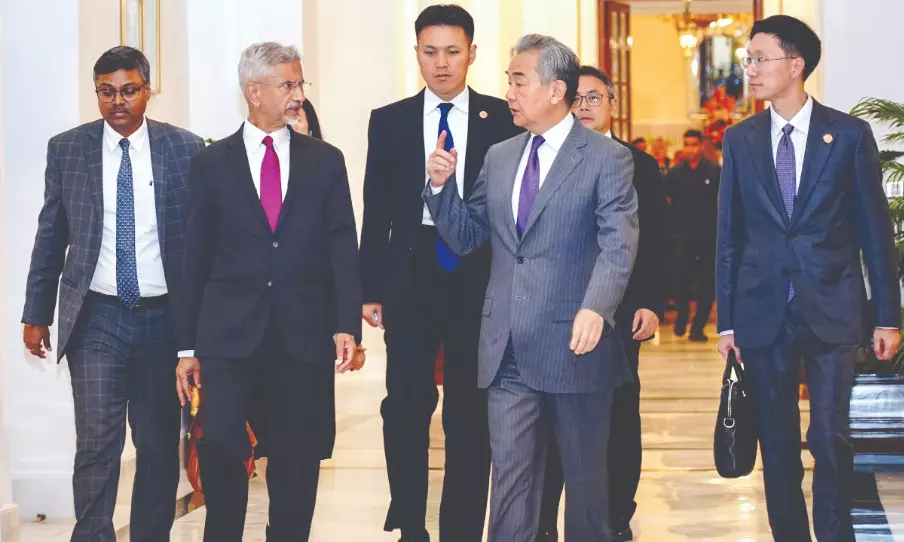Peace on border & beyond: Jaishankar, Wang Yi hold talks, stress on stability and respect in ties

New Delhi: Chinese Foreign Minister Wang Yi arrived in New Delhi on Monday evening, marking his first visit to India in three years. His two-day trip began with a meeting with External Affairs Minister S Jaishankar and will include a call on Prime Minister Narendra Modi, in what is being viewed as a significant step towards resetting strained relations between the two Asian neighbours.
The visit comes days ahead of Prime Minister Modi’s scheduled trip to Tianjin, China, for the Shanghai Cooperation Organisation (SCO) summit from August 31 to September 1. The series of high-level exchanges is expected to open avenues for dialogue on issues ranging from border disputes to regional cooperation.
In his opening remarks at the meeting, Jaishankar called for advancing the disengagement process along the Line of Actual Control (LAC) in eastern Ladakh, where Indian and Chinese troops have remained deployed in large numbers since the 2020 standoff.
“Having seen a difficult period in our relationship, our two nations now seek to move ahead. This requires a candid and constructive approach from both sides,” the external affairs minister said. He added that any forward movement should be guided by “mutual respect, mutual sensitivity and mutual interest.”
The Chinese foreign minister’s visit is seen as part of preparations for the Special Representatives (SR) dialogue on boundary issues, scheduled for Tuesday between Wang and National Security Advisor Ajit Doval. Both are designated representatives for the long-running negotiations on the border question.
“This dialogue is important because the basis for any positive momentum in our ties is the ability to jointly maintain peace and tranquillity in the border areas. It is also essential that the de-escalation process move forward,” Jaishankar said.
Although troops from both countries have disengaged from several friction points, tens of thousands remain stationed on each side of the LAC in eastern Ladakh. The upcoming SR talks are expected to explore new confidence-building measures in addition to reviewing the overall situation.
Beyond the boundary issue, the discussions also touched on trade, pilgrimages, people-to-people contacts, river data sharing, connectivity, and border trade. According to Jaishankar, these conversations would contribute to “a stable, cooperative and forward-looking relationship” that addresses the concerns of both sides.
The external affairs minister recalled matters he had raised during his July visit to Beijing and indicated he intended to follow up. Without providing details, he added, “I would like to follow up on some particular concerns that I had brought up with you.”
Jaishankar also highlighted the need for collective action against terrorism. “The fight against terrorism in all its forms and manifestations is another major priority,” he said.
The India-China discussions come at a time when both countries are navigating tensions with the United States, particularly in light of trade tariffs imposed by Washington. The two ministers also addressed the broader international situation.
“We seek a fair, balanced and multi-polar world order, including a multi-polar Asia. Reformed multilateralism is also the call of the day,” Jaishankar said, underlining the importance of enhancing stability in the global economy.
Wang Yi’s trip is being seen as part of broader diplomatic efforts to revive dialogue channels that had stalled after the deadly Galwan Valley clashes of June 2020. The violent encounter left bilateral ties deeply strained and froze most high-level engagements.
Since then, both governments have gradually moved to restore some exchanges. Recent initiatives included the resumption of the Kailash Mansarovar Yatra and India restarting the issuance of tourist visas to Chinese citizens. Direct flights, suspended during the early phase of the Covid-19 pandemic and not resumed after the border clashes, are also under consideration.
Wang is expected to convey China’s perspective on stabilising ties during his call on Prime Minister Modi. Officials believe the meeting will set the tone for further discussions during the SCO summit in Tianjin.
Jaishankar, in his closing remarks, expressed optimism about the trajectory of talks. “We expect that these discussions will contribute to building a stable, cooperative and forward-looking relationship between India and China — one that serves both our interests and addresses our concerns,” he said.
The border standoff that began in May 2020 witnessed violent clashes in the Galwan Valley, followed by years of tense military deployments. A breakthrough was reached in October 2021 when disengagement was finalised at Demchok and Depsang. Despite this, de-escalation of troops has not yet taken place.
NSA Doval’s upcoming dialogue with Wang will be the latest in a series of talks aimed at addressing this gap. His last visit to China was in December, weeks after Prime Minister Modi and President Xi Jinping met in Kazan and agreed to revive stalled dialogue mechanisms.



